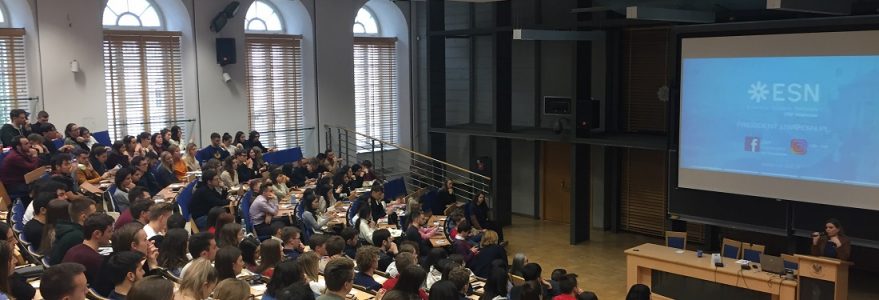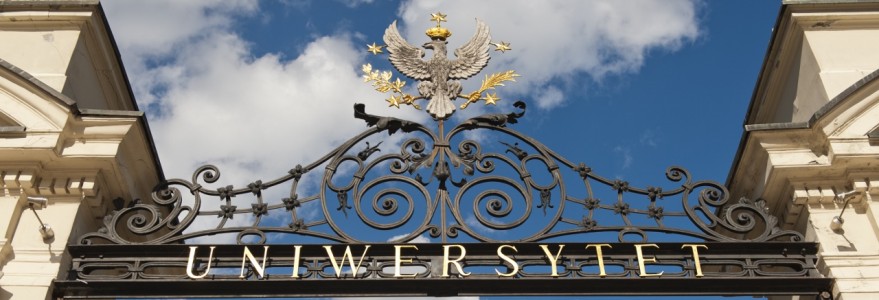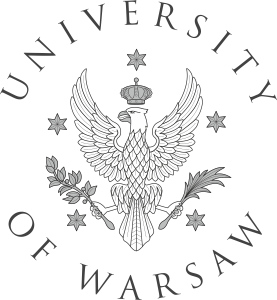24 lutego 2020
The Centre of New Technologies invites to a seminar by
Prof. Agnieszka Bzowska
Division of Biophysics, Faculty of Physics, University of Warsaw
Title: Purine salvage pathway enzymes as a target for therapies against pathogenic organisms lacking de novo purine nucleotide synthesis – case study of Helicobacter pylori
Date: February 28th, 2020 (Friday)
Time: 12:00 p.m.
Venue: Centre of New Technologies, Banacha 2C, Lecture Hall 0142 (Ground floor)
Host: prof. Joanna Trylska
There are two possible metabolic routes, which organisms can use to obtain purine nucleotides, the indispensable building blocks for DNA and RNA synthesis – de novo and salvage pathways. Some organisms, including those causing severe diseases, possess only one of them, the salvage pathway. Enzymes of this pathway are therefore good targets to disable growth and replication of such pathogenes. During the talk I will present our efforts to obtain and characterize two of the salvage pathway enzymes, purine nucleoside phosphorylase and adenylosuccinate synthase from Helicobacter pylori, and design their potent inhibitors.
18 lutego 2020
Position of adjunct (group of research workers) in the project entitled „Phase transitions in minerals induced by pressure and studied by experimental charge densities – feasibility studies” financed by National Science Centre (NCN) is open for application. (see: https://crystal.chem.uw.edu.pl/). Project leader: Prof. dr hab. Krzysztof Woźniak. Deadline for applications: 19 March 2020. For more info see >> pdf
Position of adjunct (group of research workers) in the project entitled „Phase transitions in minerals induced by pressure and studied by experimental charge densities – feasibility studies” financed by National Science Centre (NCN) is open for application. (see: https://crystal.chem.uw.edu.pl/). Project leader: Prof. dr hab. Krzysztof Woźniak. Deadline for applications: 19 March 2020. For more info see >> pdf
17 lutego 2020
The Centre of New Technologies invites to a seminar by
Dr Ishier Raote
Centre for Genomic Regulation, Barcelona, Spain
Title: TANGO1 in collagen secretion: Function and dysfunction
Date: 19th February 2020 (Wednesday)
Time: 11:00 am
Venue: Centre of New Technologies, Banacha 2C, Lecture Hall 0142 (Ground floor)
Host: Dr Piotr Szwedziak
Secreted collagens compose 25% of our dry body weight and are necessary for tissue organization, skin and bone formation. But how are these bulky cargoes, that are too big to fit into a conventional COPII vesicle, exported from the ER? Our discovery of TANGO1, a ubiquitously expressed, ER-exit-site-resident, transmembrane protein, has made the pathway of collagen secretion amenable to molecular analysis. TANGO1 acts as a scaffold to connect collagens in the lumen to COPII coats on the cytoplasmic side of the ER. However, the growth of the collagen containing mega transport carrier is not simply by accretion of a larger COPII-coated patch of ER membrane, but instead I propose that TANGO1 creates a tunnel for cargo transport between the ER and a post-ER compartment. This mechanism is conceptually different from the conventional model for carrier formation, which posits that membrane is derived entirely from a donor compartment. This proposal revises George Palade’s classical schema of carrier-mediated traffic in the secretory pathway. We have seen that TANGO1 rings the ER exit site and thus organizes a sub-compartment or „isolation chamber” within the ER. To assemble the ring, TANGO1 and its interactors mutually recruit, corral and organize each other. Most recently, we have identified the first TANGO1-associated syndromal disease in humans, which mainly manifests as a collagenopathy. Thus, in the short span of a decade, we have identified TANGO1, described a novel mechanism for its function in collagen secretion thereby proposing a radical revision of the classical views of the secretory pathway and now, we have identified a role of TANGO1 in a novel human collagenopathy.

On 17th February, a new semester will begin. About 370 of international students will start their education at the University of Warsaw. They came here for short-term Erasmus+ and other international exchange programmes. The UW International Relations Office organised a special meeting for them on 12th February.
Students could learn about how to use USOS or University Library’s resources, what formalities should be met to obtain a student card, as well as whom to ask for help in case of psychological, health and other problems.
The meeting was a part of the orientation week dedicated to students from 45 countries. During a whole orientation week, students participate in various meetings, visit the UW Main Campus, get acquainted with the materials about the university, Warsaw and Poland. Employees from the university units, e.g. the International Relations Office, Polonicum, University Library, Erasmus Student Network, UW Student Union offer assistance. UW students are also engaged in the orientation week, sharing their knowledge on accommodation at UW under the Mentor Programme.
Source: www.en.uw.edu.pl
14 lutego 2020
Position of post-doc (adiunkt) (a group of science positions) in the project entitled “From ion-selective nanofibers optical and electrochemical sensors towards „lab on a mat”” financed by National Science Centre, Poland, is open for application. Project leader: prof. dr hab. Agata Michalska-Maksymiuk. Deadline for applications: 10 May 2020. For more info see >> pdf
Position of post-doc (adiunkt) (a group of science positions) in the project entitled „Electrochemical systems with bipolar electrodes” financed by National Science Centre, Poland, is open for application. Project leader: prof. dr hab. Krzysztof Maksymiuk. Deadline for applications: 10 May 2020. For more info see >> pdf
03 lutego 2020
The Centre of New Technologies invites to a seminar by
Nuria Selva, PhD, DSc
Institute of Nature Conservation, Polish Academy of Sciences, Cracow
Title: The importance of keeping natural areas road-free
Date: 5th February 2020 (Wednesday)
Time: 1:00 pm
Venue: Centre of New Technologies, Banacha 2C, Lecture Hall 0142 (Ground floor)
Host: Prof. Marta Szulkin
31 stycznia 2020

On January 30, 2020, the World Health Organization announced a state of emergency for public health of international significance in connection with the outbreak of the 2019-nCoV epidemic.
With reference to the recommendations of the World Health Organization and the Ministry of Foreign Affairs, the University of Warsaw recommends:
- cancellation of individual and group trips of employees, doctoral students and students to China;
- addressing Chinese UW partners with a suggestion to postpone the visits of delegations from Chinese institutions until the World Health Organization cancels the state of public health emergency.
At the same time, we remind you of the recommendations of the World Health Organization on the prevention of coronavirus infections (https://www.who.int/emergencies/diseases/novel-coronavirus-2019/advice-for-public).
WHO experts recommend:
- “Frequently clean hands by using alcohol-based hand rub or soap and water;
- When coughing and sneezing cover mouth and nose with flexed elbow or tissue – throw tissue away immediately and wash hands;
- Avoid close contact with anyone who has fever and cough;
- If you have fever, cough and difficulty breathing seek medical care early and share previous travel history with your health care provider;
- When visiting live markets in areas currently experiencing cases of novel coronavirus, avoid direct unprotected contact with live animals and surfaces in contact with animals;
- The consumption of raw or undercooked animal products should be avoided. Raw meat, milk or animal organs should be handled with care, to avoid cross-contamination with uncooked foods, as per good food safety practices.”
According to the recommendations of the Ministry of Health, people who have recently been to China or in contact with such persons and who have alarming symptoms (temperature above 38 degrees Celsius, coughing, shortness of breath) should report to hospital wards of infectious diseases. Detailed information on symptoms and a list of hospital units is available at: https://www.gov.pl/web/zdrowie/byles-w-chinach-i-zle-sie-czujesz-sprawdz-co-robic.
Central administration units of the University of Warsaw are in direct contact with Chinese universities and are monitoring the development of the situation.
We remind members of our community who would like to use psychological support in connection with the coronavirus epidemic that the University of Warsaw Psychological Counselling Center offers such services, including “Walk-in clinic” (http://cpp.uw.edu.pl/walk-in-clinic/).
Current reports on the situation related to the threat of 2019-nCoV coronavirus can be found at:
- the Chief Sanitary Inspectorate,
- the Ministry of Foreign Affairs,
- the Ministry of Health,
- World Health Organization,
- European Center for Disease Prevention and Control.
Source: www.en.uw.edu.pl
27 stycznia 2020
The Centre of New Technologies invites to a seminar by
Michał Szymański, PhD
Intercollegiate Faculty of Biotechnology of the University of Gdansk and Medical University of Gdańsk
Title: An interplay between DNA replication and repair in human mitochondria
Date: January 31st, 2020 at 12 p.m.
Venue: Centre of New Technologies, Banacha 2C,
Lecture Hall 0142 (Ground floor)
Host: prof. Agnieszka Chacińska
Human mitochondrial DNA (mtDNA) replication is initiated from two different origins of replication, OriH and OriL where mitochondrial RNA polymerase (POLRMT) initiates the synthesis of short RNA primers. These primers are then used by human mitochondrial DNA polymerase γ (Polγ) to initiate DNA synthesis. Once initiated, both H-strand and L-strand synthesis proceed continuously until two new daughter molecules are formed. The RNA primers at the 5′-ends of the nascent strands must be removed by nucleases and replaced by DNA. Failure to remove ribonucleotides from mtDNA may impair ligation and DNA synthesis, causing DNA lesions which during subsequent replication cycles can cause double-strand mtDNA breaks and deletions. Number of nucleases have been implicated in primer removal but they either lack necessary enzymatic activity or their mitochondrial localization is under debate. Thus, the molecular mechanism RNA primer removal and subsequent termination of DNA replication in human mitochondria is not well understood. I will demonstrate that human mitochondrial nuclease, crucial for mitochondrial DNA repair, is efficient in removal of RNA primers and in concert with other mitochondrial factors promotes processing and termination of mtDNA replication.



